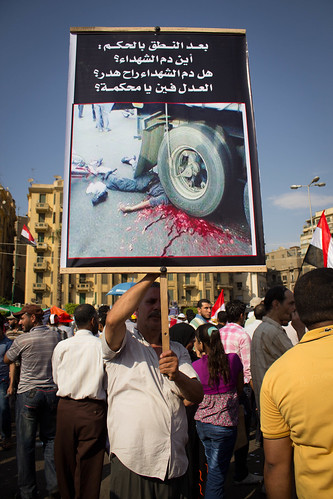
On the 9th of October 2011 a protest march of Copts in Cairo ended in a massacre. At least 27 people were killed and more than 300 wounded when the peaceful protest was violently dispersed by the army.
Mariam, one of my students from back in my teaching days, was there, and saw army tanks drive over civilians. Tears well up in her eyes as she tells me about what she saw that evening.
“One of my classmates asked me if I wanted to join a march going from Shubra to Maspiro, the state television building in down town Cairo”, she begins her story. “They wanted to protest the burning of a church a few weeks earlier. I thought it was a good cause, so I decided to join her.”
“I had never participated in a march, or even a demonstration, but it liked it. The atmosphere was calm and friendly. There were many families, young people and little kids. It was all very relaxed.”
Gunshots
When Maspiro came in sight, Mariam heard gunshots, and people dispersed in panic. “We were being shot at from the back, from the bridge, or maybe from underneath the bridge”, she recalls.
“For some reason we ran towards the television building, towards the tanks, I think because we thought they would protect us from those who were shooting at us. We had no idea that we were being shot at by the army.”
“Suddenly the tanks started moving as well. They were going very fast. It seemed like they were purposely trying to run people over. We were hunted down the street from one side to the other. The tanks were coming from all directions. It was horrible. The tanks were running over people like they were rag dolls. They were flying everywhere.”
“I saw a man getting stuck in front of a tank. He couldn’t get away in time, people were in his way. It was panic, sheer chaos. People were running everywhere.”
Surreal
“The tank ran him over. It was surreal. I’ll never forget the cracking sound his skull made as the tank crushed his body. To this day it haunts me in my nightmares. It was one of those moments where you know something is going to happen that you do not want to see, but you’re eyes are fixated and you can’t look away.”
“After the tank had ran him over his face was practically gone. It was the most horrific thing I have ever seen. People next to me were throwing up at the sight of it. It was terrible.”
Mariam managed to get to safety through some back streets behind Maspiro and walked around crying and severely distraught for at least ten minutes. Finally, a passerby in a car picked her up and drove here home, to her extremely concerned parents, who had been following the news on TV.
Her classmate, whom Mariam had lost in the chaos, got shot in the leg and was brought to a local hospital. She can no longer stand to talk about what happened that evening.
Involuntary manslaughter
It has been a year since Maspiro and so far only three soldiers have been found guilty of involuntary manslaughter. Read: running people over by accident. They got prison sentences ranging from two to three years. In comparison: that is a similar punishment to what one would get for blasphemy in Egypt.
The Egyptian army has never excused itself or even taken responsibility for the massacre. Mariam believes the whole incident was foul play. “It was a carefully planned attack by the army. They were purposefully running over people. They were out to kill as many Copts as they possibly could.”

No comments:
Post a Comment